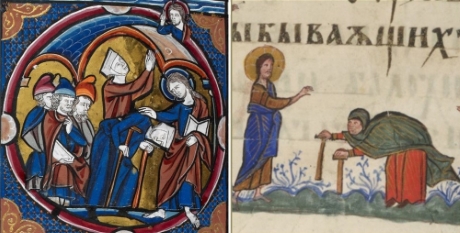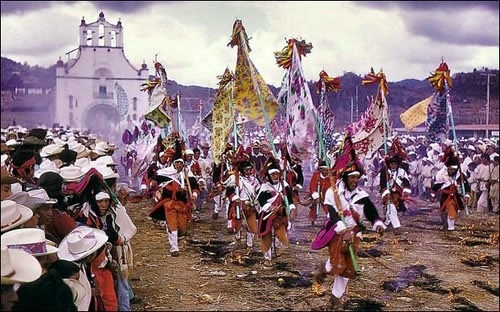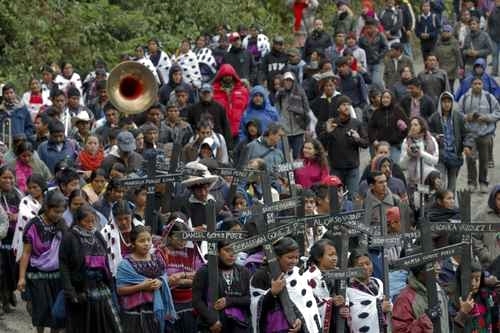The majority of Indigenous Peoples continue to be “bent over”
 "One Sabbath, Jesus was teaching in a Jewish meeting place, and a woman was there who had been crippled by an evil spirit for eighteen years. She was completely bent over and could not straighten up. When Jesus saw the woman, he called her over and said, “You are now well.” He placed his hands on her, and right away she stood up straight and praised God." (Lk 13, 10-13)
"One Sabbath, Jesus was teaching in a Jewish meeting place, and a woman was there who had been crippled by an evil spirit for eighteen years. She was completely bent over and could not straighten up. When Jesus saw the woman, he called her over and said, “You are now well.” He placed his hands on her, and right away she stood up straight and praised God." (Lk 13, 10-13)
I would like to linger a bit on some points of this beautiful text so encouraging to everyone. The words “that had crippled her for eighteen years...bent over, and quite unable to stand up straight”. I ask myself: What are eighteen years for a woman? Her whole life. It is an imperfect time; I don’t know why, but I think in the number 6x3, maybe a bit exaggeratedly, but I would say it is the total imperfection. This woman was completely imperfect in the eyes of the world, and what is imperfect does not merit to be payed attention to, but rather left discarded, and missing. I think of so many men and women who are in these same circumstances who we see as imperfect, because of religion, social condition, color, raze, ideas, inability or capabilities...
It is incredible, if we continue to look for which is the imperfection in our world, those we see, or what things we see as imperfect. Our world makes us see that what is imperfect does not have a place. In this text, it is not only the time, symbolic or not, what has plays a role, it is also the fact that the woman is bent over. What does it mean for us the term “bent over”? If we had the experience of being bent down, it would lead us to become aware that we can only look at the ground and a bit around us, but physically we could not see beyond that. What actually happens in our world with the peoples, who in spite of globalization, modernity and advanced technology continue to be poor and marginalized, suffer from hunger and continue in a situation, not only intellectually but economically and socially dominated. They continue to be bent over.
In our rural and indigenous world, in spite of the cultural richness of the Mayan people, Tsotsiles, Tseltales, we see that as much the men as the women are bent over because they cannot yet have access to their human rights as persons. They are tacitly denied all what a good life entails: education, health, property and food production. It is a type of remaining ‘bent over’ as they can observe all what modernity brings but cannot straighten themselves up and benefit from the day-to-day world innovations. Indigenous peoples take it as a natural thing to bow as they are used to live that way. The experience of hearing them say “I don’t know”, “I don’t know how to think”, I don’t have a thought”, are phrases which make us discover that even in the XXI Century, the great majority of Indigenous peoples continue to be “BENT OVER”. Too many aspects make them so: marginalization because their languages are considered as folkloric, also their clothing, customs and celebrations. They are not allowed to see beyond all of these, rather, they are kept into a certain attitude of shame for speaking their language, or to continue on with their habits and vision of the cosmos. Now, what about Jesus? Jesus goes to the Synagogue on Saturd From Mexicoay and He sees the “bent over woman”. His sensibility and compassion seeing a daughter of God for so many years in such state is huge. Jesus, has no blocks, He is not bent over, his relationship and closeness to the Father makes him be erect, upright and allows him to see beyond himself, to discover the reality around him; it allows him to see the need in the other, to discover that others live in suffering, they experience marginalization, loneliness, isolation, inferiority... It makes him compassionate, loving and supportive as his Father is, to trust in that daughter of God who has a right to be happy and to see the world as He sees it.
From Mexicoay and He sees the “bent over woman”. His sensibility and compassion seeing a daughter of God for so many years in such state is huge. Jesus, has no blocks, He is not bent over, his relationship and closeness to the Father makes him be erect, upright and allows him to see beyond himself, to discover the reality around him; it allows him to see the need in the other, to discover that others live in suffering, they experience marginalization, loneliness, isolation, inferiority... It makes him compassionate, loving and supportive as his Father is, to trust in that daughter of God who has a right to be happy and to see the world as He sees it.
It is at this time that Jesus calls the “bent over woman”, touches her and says to her: “woman, be free of your sickness”. Many years had passed during which she had no hope, and had gotten used to live that way... such as many Indigenous peoples have gotten used live... And now Jesus comes and says to them, as He did to the woman: “you are free from your impairment...” He touches her and she becomes upright...What a joy! Only a word was enough for her to be healed! Just a word from Jesus heals. Similarly with the Indigenous peoples, one word is enough for the people to become upright and to walk, to discover all what God has given to humans and which they can admire, enjoy and discern what is the best for them to improve their li From Mexicoves and to have a truly good life”. Each group of people may ask itself if God has called and touched it, if He has said: “be free”, and in becoming upright see a different and marvelous panorama. Discernment then follows, to see what is it that gives life and what is it that causes death... each nation has the opportunity to see Jesus, to experience him and to live as He experienced his Father. The challenge is for everyone without discrimination or rejection to repeat: “Rise up, shine forth, for the light, the glory of the Lord dawns over you” and to walk transformed by Jesus, to be better nations and better Christians!
From Mexicoves and to have a truly good life”. Each group of people may ask itself if God has called and touched it, if He has said: “be free”, and in becoming upright see a different and marvelous panorama. Discernment then follows, to see what is it that gives life and what is it that causes death... each nation has the opportunity to see Jesus, to experience him and to live as He experienced his Father. The challenge is for everyone without discrimination or rejection to repeat: “Rise up, shine forth, for the light, the glory of the Lord dawns over you” and to walk transformed by Jesus, to be better nations and better Christians!
Personally, I could ask myself, how many years have I been bent over? How many years have I lived just seeing the tip of my nose? How have I discovered I am bent over? Why? There could be many reasons, many ideas, thoughts, actions... fears, visions. But I have someone who can straighten me up... someone to whom many times I don’t listen, don’t see and don’t experience... Why don’t I make silence within me? Or listen within my heart? Maybe deep within I may hear the voice of God who says to me: come closer that I may touch you. He wants to heal me... Maybe it is not within me but someone whose word motivates me to see beyond myself... to go to the other, to see the needs of others, their concerns, joys and hopes... Or to take His Word, so as to break it open and to find in it the message of life which God gives us.
Jesus, you are the one who calls me, touches and heals me, I thank you for showing yourself at all times through the persons, the events and your Word. Today you invite me to look at my inability to stand up straight, to acknowledge that only by letting myself be touched by you can I stand upright and see the world the way you have made it, not as we have turn it. It is, therefore, a challenge for me to discern God’s call day by day and to let it transform my life.
Text: Sr. Dorys Gilma Zorro


 EN
EN  ES
ES  FR
FR 



